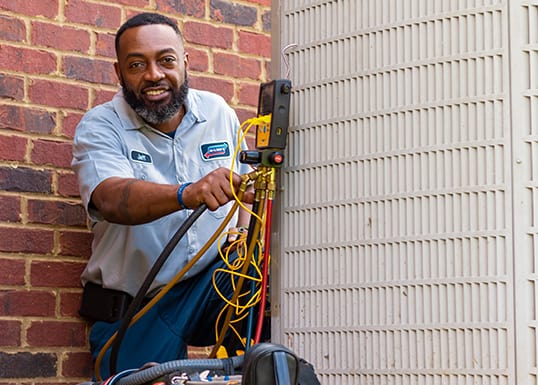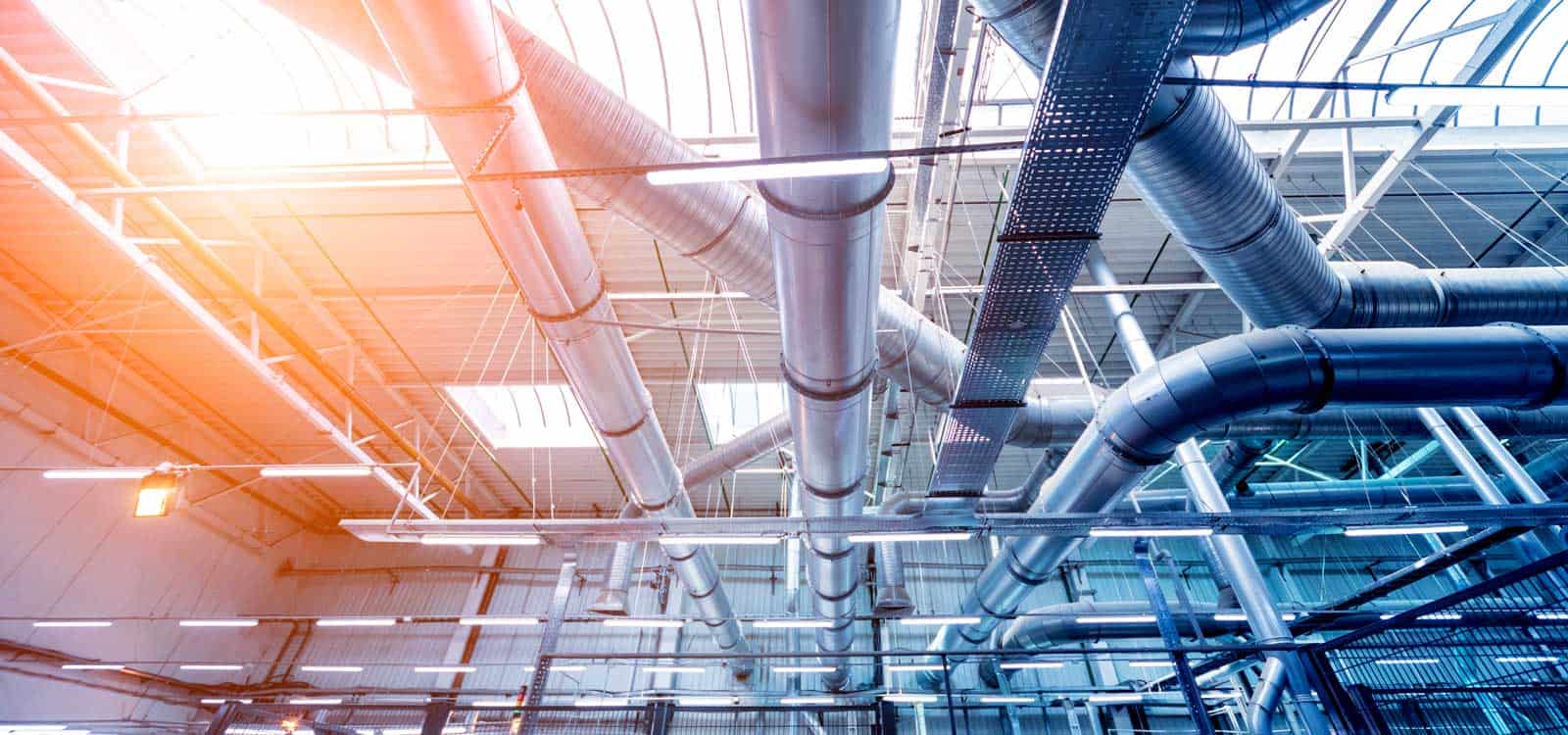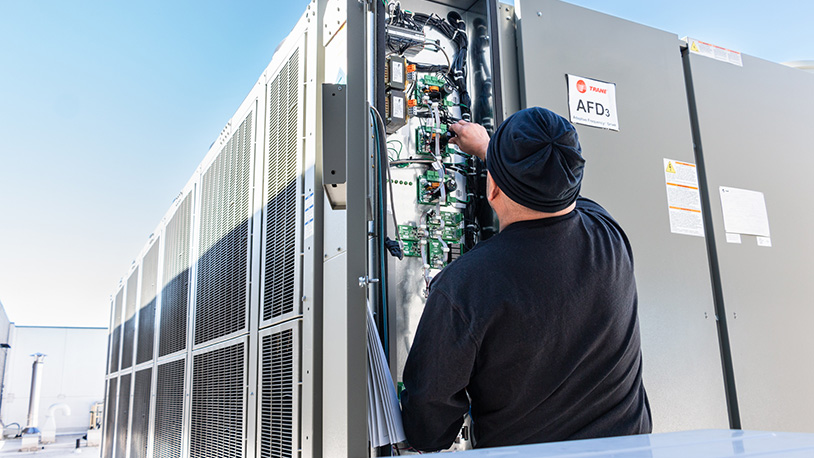Learn how HVAC experts use state-of-the-art technology to enhance efficiency
Wiki Article
Exploring the Essential Components of an Efficient A/c System
An efficient HVAC system is constructed on a number of crucial elements that work in harmony. Each part, from the thermostat to the ductwork, plays an essential function in keeping comfort and power effectiveness. Understanding these components is vital for enhancing performance and boosting interior air quality. As one takes a look at these parts, the intricate connections between them reveal insights right into boosting overall system effectiveness. What particular elements contribute most to this efficiency?The Duty of the Thermostat in Cooling And Heating Performance

Although commonly forgotten, the thermostat plays an important duty in the efficiency of a/c systems. HVAC experts. This little tool works as the main control center, regulating temperature level settings and guaranteeing optimal comfort within an area. By precisely noticing the ambient temperature level, the thermostat interacts with the air, heating, and ventilation conditioning units to keep the desired climate
A reliable thermostat minimizes energy consumption by triggering the heating and cooling system only when needed, consequently preventing too much home heating or cooling. Modern clever and programmable thermostats enhance this efficiency further by permitting individuals to set routines and remotely adjust setups, adapting to everyday routines.
The placement of the thermostat is important; incorrect place can lead to incorrect temperature readings, resulting in ineffective operation. Generally, a well-functioning thermostat not just boosts convenience however additionally adds markedly to energy cost savings and the long life of the a/c system.
Understanding the Value of Air Filters
Air filters serve a vital feature in a/c systems by guaranteeing that the air distributing within an area stays tidy and healthy and balanced. These filters trap dirt, irritants, and other pollutants, stopping them from being recirculated throughout the environment. By catching these particles, air filters add to boosted interior air high quality, which can considerably benefit passengers' health and wellness, especially those with allergies or respiratory system conditions.In addition, preserving clean air filters improves the effectiveness of heating and cooling systems. Stopped up filters can limit airflow, triggering the system to work more difficult to preserve desired temperatures, bring about enhanced power consumption and greater energy bills. Routinely changing or cleaning filters is an important maintenance action that can prolong the lifespan of heating and cooling tools. Inevitably, comprehending the value of air filters permits home owners and structure supervisors to take aggressive actions to guarantee a well-functioning, reliable HVAC system that advertises a secure and comfy interior environment.

The Capability of the Heater and Heatpump
Furnaces and warmth pumps are vital parts of heating and cooling systems, responsible for offering warmth during colder months. Furnaces run by heating air via burning or electric resistance, then distributing it throughout the home using air ducts. They usually use quick heating and can be sustained by gas, electrical power, or oil, depending upon the system type.On the other hand, heatpump move warm instead of create it. They draw out warmth from the outdoors air or ground, also in reduced temperatures, and transfer it indoors. HVAC experts. This dual capability enables warm pumps to additionally give cooling in warmer months, making them functional options for year-round climate control
Both systems need proper upkeep to ensure efficiency and longevity. While heaters excel in extreme cool, heatpump can be helpful in moderate climates. Understanding their distinct capabilities aids house owners in selecting the most appropriate option for their heating requires.
Discovering the Cooling Device
The cooling unit is a vital component of HVAC systems, readily available in various types to fit various needs. Comprehending the effectiveness rankings of these units is crucial for making educated options regarding energy intake and expense. This section will check out the varied sorts of air conditioners and make clear just how efficiency ratings influence efficiency.Sorts Of Air Conditioners
While various aspects affect the option of air conditioning systems, recognizing the different types available is vital for house owners and structure managers alike. Central air conditioning conditioners are made to cool down entire homes or buildings, utilizing a network of air ducts for air flow. Home window devices provide a more local service, perfect for tiny rooms or solitary spaces. Portable air conditioning unit give flexibility, allowing individuals to relocate the system as required. Ductless mini-split systems are one more alternative, combining the efficiency of main systems with the benefit of zoning, as they require no ductwork. Geothermal systems harness the planet's temperature for energy-efficient air conditioning. Each type comes with unique advantages, making educated selections essential for effective climate control.
Efficiency Rankings Explained
Recognizing efficiency rankings is crucial for picking the right air conditioning unit, as these metrics offer understanding into the system's efficiency and power consumption. The most usual rating for air conditioning unit is the Seasonal Energy Effectiveness Ratio (SEER), which gauges the cooling outcome during a typical cooling period split by the overall electrical energy input. A greater SEER shows far better effectiveness. In addition, the Power Performance Ratio (EER) is made use of for determining performance under certain conditions. Another essential metric is the Power Celebrity qualification, which indicates that a system meets rigorous power performance guidelines. By evaluating these rankings, customers can make educated options that not only enhance comfort yet additionally minimize power costs and environmental impact.The Importance of Ductwork and Airflow
Efficient ductwork layout and air flow management play essential roles in the total effectiveness and efficiency of HVAC systems. Correct ductwork warranties that conditioned air is dispersed evenly throughout a space, decreasing temperature variations and enhancing convenience. Properly designed ducts minimize resistance to airflow, minimizing the work on a/c devices and inevitably decreasing energy consumption.Air movement management includes purposefully positioning vents and signs up to improve the flow of air. This protects against common concerns such as warm or cool spots, which can take place when air movement is blocked or inadequately balanced. Furthermore, the best air duct products and insulation can further improve effectiveness by lowering warm loss or gain during air transit.
An effective ductwork system not just adds to energy savings however can also extend the lifespan of a/c equipment by reducing unneeded pressure (HVAC experts). Comprehending the significance of ductwork and air flow is necessary for achieving peak Heating and cooling system efficiency.
Routine Upkeep Practices to Improve Efficiency
Regular maintenance methods are vital for guaranteeing peak performance of a/c systems. These techniques include regular evaluations, cleansing, and needed repairs to keep the system running effectively. On a regular basis transforming air filters is essential, as clogged up filters can block airflow and decrease effectiveness. In enhancement, technicians ought to inspect and tidy evaporator and condenser coils to stop getting too hot and power wastage.Yearly specialist assessments are additionally recommended, as skilled professionals can determine prospective issues before they intensify. Lubing relocating components lessens wear and tear, adding to a longer life-span for the system. In addition, guaranteeing that the thermostat operates correctly aids in maintaining optimal temperature level control.

Regularly Asked Questions
Exactly how Commonly Should I Replace My Thermostat?
Thermostats ought to usually be replaced every 5 to 10 years, depending upon use and technology developments. Routine checks are suggested to assure peak performance, particularly if experiencing irregular temperature level control or raised power costs.What Size Air Filter Is Finest for My Cooling And Heating System?
The best size air filter for a cooling and heating system differs by device style. Commonly, it's essential to seek advice from the proprietor's manual or inspect the existing filter measurements to guarantee peak performance and air top quality.Can I Install a Heat Pump Myself?
Mounting a heatpump separately is feasible for knowledgeable people, yet it calls for knowledge of electric systems and local codes. Working with a specialist is advised to assure correct installation and ideal system efficiency.Just how Do I Know if My Ductwork Is Reliable?
To figure out ductwork performance, one need to look for leaks, step air movement at vents, inspect insulation quality, and examine temperature differences in between supply and return air ducts. Expert assessments can offer thorough insights right into total performance.What Are Signs My A/c Requirements Immediate Maintenance?
Indications that a HVAC system needs immediate upkeep consist of unusual sounds, inconsistent temperatures, raised energy bills, unpleasant odors, and constant cycling. Resolving these problems without delay can prevent further damages and assurance height system efficiency.Air filters serve a vital feature in Heating and cooling systems by guaranteeing that the air flowing within a room remains healthy and balanced and clean. Additionally, preserving clean air filters improves the efficiency of A/c systems. Ductless mini-split systems are check here one more alternative, incorporating the efficiency of main systems with the ease of zoning, as they require no ductwork. Recognizing effectiveness scores is essential for selecting the ideal air conditioning system, as these metrics give understanding right into the system's performance and energy consumption. The finest dimension air filter for a HVAC system differs by device design.
Report this wiki page